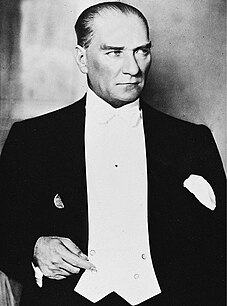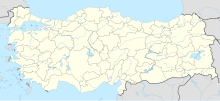
Archeological Museum of Manisa is an archeological museum within the Manisa Museum, situated in the historic kulliye of Muradiye Mosque. Local and regional artefacts from antique Magnesia, Sardes and other regional towns are displayed. The museum displays cover a wide range of eras from prehistory to the 20th century. Ethnography Museum is in the nearby building. The museum was opened on October 29, 1937.

The Trabzon Museum, also known as Kostaki Mansion, is a historic house museum with archeological and ethnographic exhibitions located in Trabzon, Turkey.

The Rákóczi Museum also known as Rákóczi House, is a historic house museum in Tekirdağ, northwestern Turkey, which is a rebuilt 18th-century house devoted to the life and times of the Hungarian national hero, Francis II Rákóczi, who lived in this house in exile during his last years between 1720 and 1735. The house was transformed in 1982 into a museum after it was donated to the Hungarian State. Since then, it became a place of national pilgrimage for Hungarians.

The İzmir Art and Sculpture Museum and Gallery is an art museum in İzmir, Turkey.
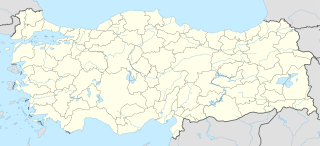
The Namık Kemal House Museum is a historic house museum in Tekirdağ, northwestern Turkey devoted to the life and works of Namık Kemal (1840–1888), Turkish nationalist poet. It is a rebuilt 19th-century house, which was transformed 1993 into a museum.
The Ahmet Arif Literature Museum Library is a literary museum and archive dedicated to Turkish literature and named after the poet Ahmet Arif (1927–1991). Located in Diyarbakır, Turkey, the museum was established by the Ministry of Culture and Tourism and opened on June 1, 2011.

Tarsus Museum is an archaeology and ethnography museum in Tarsus, Mersin Province, in southern Turkey.
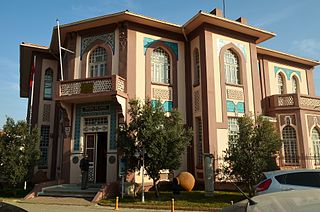
Tekirdağ Museum of Archaeology and Ethnography, shortly Tekirdağ Museum, is a national museum in Tekirdağ, Turkey, exhibiting archaeological artifacts found in and around the province, as well as ethnographical items related to the region's cultural history.

Kırklareli Museum is a national museum in Kırklareli, Turkey, exhibiting natural history specimens, ethnographical items related to the region's history of cultural life, and archaeological artifacts found in and around the city. The director of the museum is Derya Balkan.

The Afyonkarahisar Archaeological Museum, also known as the Afyon Museum, is an archaeological museum in Afyonkarahisar, Turkey. It exhibits a wide variety of artifacts from the Copper Age, Bronze Age and the civilizations of Hittites, Phrygians, Ancient Greece and the Byzantine Empire.
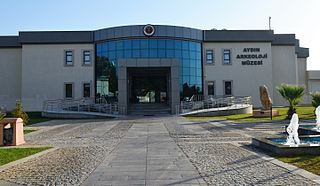
Aydın Archaeological Museum is in Aydın, western Turkey. Established in 1959, it contains numerous statues, tombs, columns and stone carvings from the Hellenistic, Roman, Byzantine, Seljuk and Ottoman periods, unearthed in ancient cities such as Alinda, Alabanda, Amyzon, Harpasa, Magnesia on the Maeander, Mastaura, Myus, Nisa, Orthosia, Piginda, Pygela and Tralleis. The museum also has a section devoted to ancient coin finds.

Bursa Archaeological Museum, shortly Bursa Museum, is a national museum in Bursa, Turkey, exhibiting archaeological artifacts found in and around the province.

Sinop Archaeological Museum, or Sinop Museum, is a national museum in Sinop, Turkey, exhibiting archaeological artifacts found in and around the city.

Konya Ereğli Museum is an archaeological and ethnographic museum in Ereğli district of Konya Province, Turkey. Situated in the İstasyon cad, it is operated by the Ministry of Culture and Tourism.

Amasya Museum, also known as Archaeological Museum of Amasya is a national museum in Amasya, northern Turkey, exhibiting archaeological artifacts found in and around the city as well as ethnographic items related to the region's history of cultural life. Established in 1958, the museum owns nearly twenty-four thousand items for exhibition belonging to eleven historic civilizations.

Amasra Museum is a museum in Amasra district of Bartın Province, northwestern Turkey. Established in 1982, it exhibits archaeological artifacts and ethnographic items.

Kocaeli Museum, a.k.a. Kocaeli Archaeology and Ethnography Museum or İzmit Museum, Turkish: Kocaeli Müzesi) is a national museum in Kocaeli (İzmit), northwestern Turkey, exhibiting archaeological artifacts and ethnographic objects. It is housed in the former railway station of İzmit.

Museum of the Nationalist Forces in Balıkesir is a museum in Balıkesir, Turkey, dedicated to the irregular Kuva-yi Milliye formed as part of the Turkish National Movement during the Turkish War of Independence (1919–1923).

Bursa Forestry Museum is a museum in Bursa, northwestern Turkey dedicated to forestry. Opened in 1989, it is housed in a historic Ottoman era mansion. Its collection size is nearly 1,000 items.

Bursa Karagöz Museum is a museum located at Osmangazi in Bursa, northwestern Turkey, dedicated to the folkloric shadow play figures Karagöz and Hacivat. It was established in 2007.



